Potřebujeme váš souhlas k využití jednotlivých dat, aby se vám mimo jiné mohly ukazovat informace týkající se vašich zájmů. Souhlas udělíte kliknutím na tlačítko „OK“.
ASTM F2508-13
Standard Practice for Validation, Calibration, and Certification of Walkway Tribometers Using Reference Surfaces
Automaticky přeložený název:
Standardní praxe pro validaci, kalibrace a certifikace Příchod Tribometers pomocí referenčního ploch
NORMA vydána dne 1.4.2013
Informace o normě:
Označení normy: ASTM F2508-13
Poznámka: NEPLATNÁ
Datum vydání normy: 1.4.2013
Kód zboží: NS-54028
Počet stran: 6
Přibližná hmotnost: 18 g (0.04 liber)
Země: Americká technická norma
Kategorie: Technické normy ASTM
Kategorie - podobné normy:
Anotace textu normy ASTM F2508-13 :
Keywords:
slip properties, walkway tribometer, ICS Number Code 17.040.20 (Properties of surfaces), 93.080.10 (Road construction)
Doplňující informace
| Significance and Use | ||||||||
|
5.1 To be meaningful, walkway tribometer results must correlate the slip characteristics of a surface or contaminant, or both, to the actual propensity for human slips. To achieve this goal, walkway tribometer models must be validated against a standard with relevance to human ambulation. 5.2 This practice prescribes a series of reference surfaces with known relative slip potential ranging from very high to low (as defined by laboratory conditions only) upon which walkway tribometer models can be validated. The relative slip potential of each reference surface was established from human subject walking trials.3 5.3 The following should be considered in applying the validation and calibration obtained by this practice: 5.3.1 The scientific study upon which the validation process is based was conducted with a select population of young adults (mean age 26 years) who were free from gait deviations while walking in a straight path on a level surface with a mean walking velocity of 2.18 m/s. This walking velocity is faster than the average walking velocity for the general population which includes a much wider age range with greater variability; thus, the study sample population of pedestrians and conditions is not representative of the larger general population of pedestrians. 5.3.2 All subjects walked in Oxford-style shoes whose soles were constructed of smooth styrene butadiene rubber (SBR) with 75A Shore hardness. The shoe style and sole material is not representative of all combinations available in the marketplace. 5.3.3 The reference surfaces defined in this practice are not representative of all walkway surfaces. The outcome of the validation practice reflects performance on the type of reference surfaces and surface conditions defined in this practice only. Validation and calibration of a walkway tribometer as defined by this practice does not imply validation and calibration under all combinations of test foot materials and walkway surfaces. 5.3.4 The validation and calibration procedure defined by this practice is not intended to establish a “safe threshold” value for any walkway surface. |
||||||||
| 1. Scope | ||||||||
|
1.1 This practice is intended to establish the procedures for validation, calibration, and certification of walkway tribometers. 1.2 This practice provides a walkway tribometer supplier with a procedure and suite of reference surfaces to validate his walkway tribometer by properly ranking and differentiating the surfaces. 1.3 This practice provides the user of a walkway tribometer with a procedure and suite of reference surfaces to test calibration of his instrument. 1.4 This practice provides a procedure through which an entity may certify a walkway tribometer model, signifying that the walkway tribometer model has a completed and documented validation and interlaboratory study. 1.5 This practice describes the necessary materials, specifications, and the cleaning process for reference materials, as well as the requirements for the validation of a supplier’s walkway tribometer and calibration of a user’s walkway tribometer. 1.6 This practice applies to walkway tribometers without reference to the nature of the scale of the readings produced by them. The scale used in the reports of validation and calibration must be the same, and are to be those of the instrument or defined for the instrument. 1.7 The values stated in SI units are to be regarded as standard. The values given in parentheses are for information only and are not considered standard. 1.8 This standard does not purport to address all of the safety concerns, if any, associated with its use. It is the responsibility of the user of this standard to establish appropriate safety and health practices and determine the applicability of regulatory limitations prior to use. |
||||||||
| 2. Referenced Documents | ||||||||
|
Podobné normy:
Historická
1.5.2014
Historická
1.11.2010
Historická
1.5.2014
Historická
1.11.2010
Historická
1.4.2010
Historická
1.5.2010


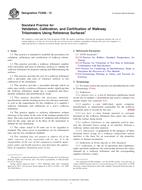
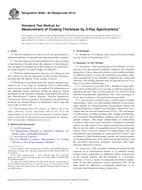 ASTM B568-98(2014)..
ASTM B568-98(2014)..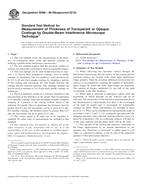 ASTM B588-88(2010)..
ASTM B588-88(2010)..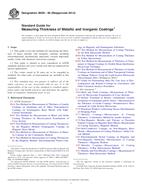 ASTM B659-90(2014)..
ASTM B659-90(2014)..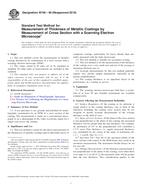 ASTM B748-90(2010)..
ASTM B748-90(2010)..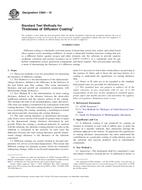 ASTM C664-10
ASTM C664-10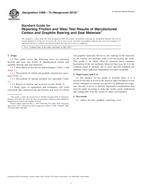 ASTM C808-75(2010)e1..
ASTM C808-75(2010)e1..
 Cookies
Cookies
